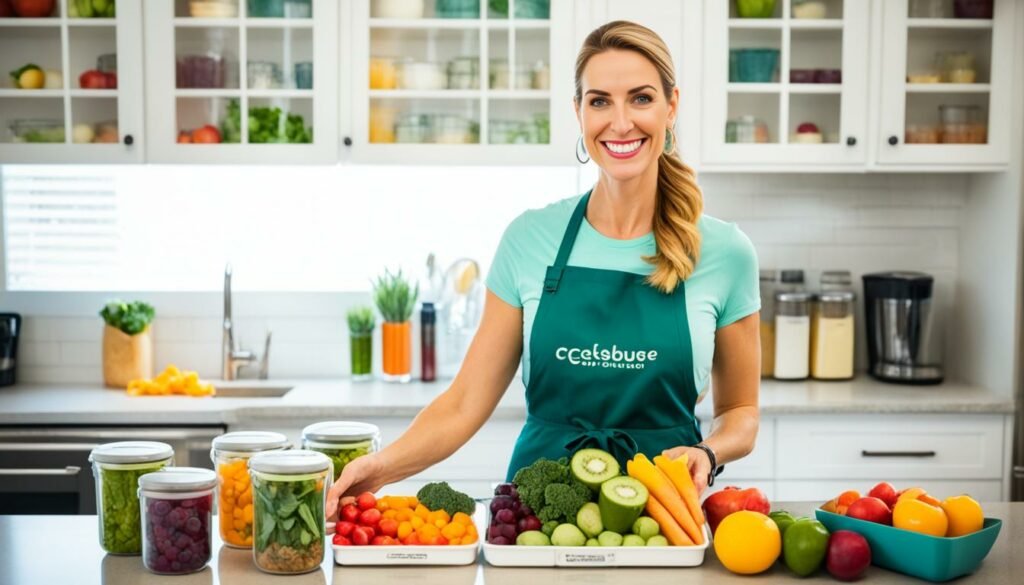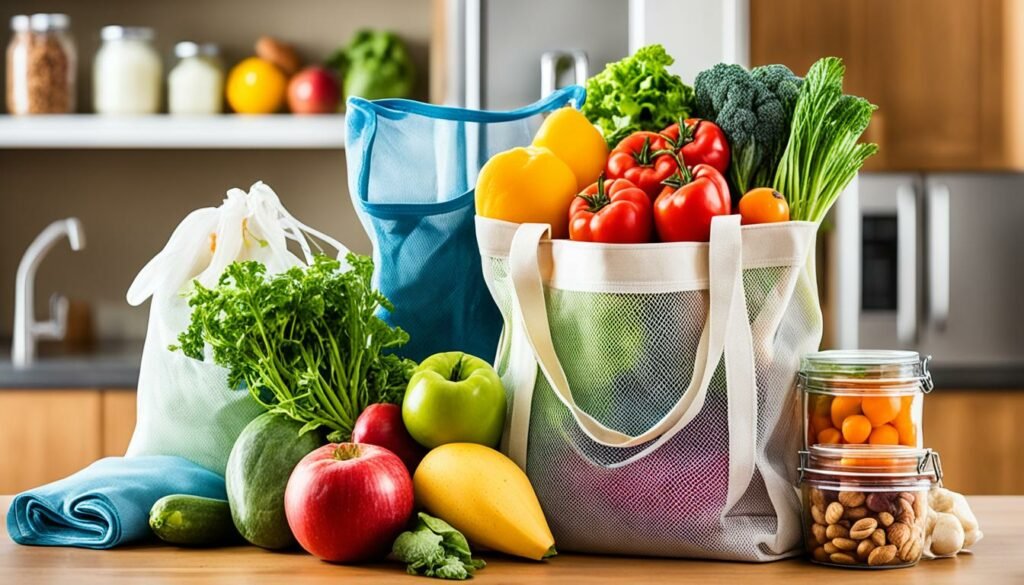Did you know Americans generate about 292.4 million tons of trash annually? That’s roughly 4.4 pounds of waste per person, every day. This statistic underscores the pressing need for effective waste reduction strategies. Adopting a zero waste lifestyle is a powerful way to fight this issue and embrace sustainable living.
By integrating zero waste shopping hacks and tips into my daily life, I’ve significantly reduced my environmental impact. This article aims to offer practical advice for newcomers to this lifestyle. It covers how to cut down on single-use items, shop for eco-friendly products, and handle waste properly. Together, we can move towards a more sustainable future.
After conducting a waste audit and evaluating my habits, I pinpointed areas for improvement. These strategies will empower you to make better shopping choices, ultimately decreasing your waste output. Let’s delve into how to initiate the zero waste lifestyle and positively impact our planet.
For further insights on this path, explore these zero waste shopping hacks and tips. They offer guidance towards sustainability.
Understanding the Zero Waste Lifestyle
Starting a zero waste lifestyle means adopting a sustainable way of living that focuses on reducing waste. It involves making choices about the products and how I use them. Using plastic-free alternatives daily not only cuts down on waste but also boosts my health.
The Meaning of Zero Waste Living
Zero waste living aims to minimize the trash an individual produces. It’s about making choices to avoid waste, avoiding single-use plastics, and using reusable items. This mindset makes me think about how I consume things and adopt a minimalist lifestyle. Every item I own should have a purpose and help the environment.
The Impact of Packaging on Waste Generation
Knowing how packaging affects waste is key for a zero waste lifestyle. Many foods come with a lot of packaging that can’t be recycled. I’ve noticed that things like thin plastic bags and packaging for everyday items add a lot of unnecessary waste. Choosing plastic-free options helps me make purchases that support sustainability.
Essential Preparations Before Shopping
Effective planning significantly reduces waste when shopping. By adopting meal planning, I can pinpoint the ingredients needed for the week. This approach ensures I avoid unnecessary purchases, promoting better health and lower expenses.
Meal Planning to Reduce Waste
Engaging in meal planning structures my grocery shopping. I map out meals for the week, creating accurate ingredient lists. This method leads to efficient shopping and less food waste.
Creating an Inventory List to Avoid Over-Purchasing
Before compiling my shopping list, I inventory my pantry and fridge. This step is crucial for avoiding duplicates and optimizing existing stock. An inventory list not only simplifies shopping but also prevents fresh items from expiring.
Preparing Reusable Items for Your Shopping Trip
For my shopping, reusable containers and bags are indispensable. I always gather these items beforehand. Having reusable containers ready in my car or bags supports sustainability and reduces single-use plastic consumption.

| Preparation Technique | Description | Benefits |
|---|---|---|
| Meal Planning | Organizing meals for the week in advance. | Reduces impulse purchases and food waste. |
| Inventory List | Listing items already available at home. | Avoids over-buying and ensures freshness. |
| Reusable Items | Bringing containers and bags for shopping. | Minimizes single-use plastic waste. |
Zero Waste Shopping Hacks and Tips
Adopting zero waste shopping hacks has profoundly reduced my environmental footprint. Using reusable produce bags has been a pivotal change, enabling me to buy fruits and vegetables without plastic. This approach not only cuts down on waste but also promotes more thoughtful shopping habits.
Utilizing Reusable Produce Bags
One of the most straightforward yet impactful zero waste shopping hacks is employing reusable produce bags. These bags eliminate the need for disposable plastic bags found in grocery stores. While shopping, I sort my produce into these bags, which are crafted from breathable materials. This keeps fruits and vegetables fresh and supports my waste reduction efforts.
Taking Your Own Containers for Bulk Shopping
Bulk shopping is a prime strategy for minimizing packaging waste. I always carry my containers to fill with grains, nuts, and beans. Many stores permit me to weigh my containers before filling them, ensuring I purchase exactly what I need without extra plastic. This method embodies my dedication to a sustainable lifestyle. For further insights on bulk shopping, explore tips on zero waste shopping routines.
Finding Local Bulk Stores and Farmers’ Markets
Exploring local bulk stores and farmers’ markets has been incredibly fulfilling. I relish in selecting seasonal produce directly from local farmers and support my community. These markets offer minimal packaging, aligning with my waste reduction goals. Interacting with local vendors enriches my understanding of the food’s journey from farm to table. For more eco-friendly advice, see this guide on zero waste tips.

Navigating the Grocery Store for Waste Reduction
Entering a grocery store, my approach significantly influences my waste reduction efforts. I avoid processed items in the middle aisles, opting for fresh foods around the perimeter. This choice not only aids in sustainable living but also offers healthier options.
Shopping the Perimeter for Fresh Foods
Shopping the perimeter is a smart move for a healthier, more sustainable grocery trip. Here, I find:
- Fresh fruits
- Vegetables
- Meats
- Dairy products
These items form a balanced diet and have less packaging than processed foods. By choosing fresh options, I help reduce waste and improve my meals.
Purchasing Seasonal and Local Produce
My grocery shopping also focuses on seasonal produce. I look for:
- Locally grown fruits and vegetables
- Items in season for better flavor
- Produce that supports local farmers and businesses
Choosing these options saves money and reduces the carbon footprint from long-distance transport. It’s a move that supports sustainable living, ensuring I get the freshest produce and cut down on waste.
Shopping wisely lets me live a sustainable life with efficient waste reduction. By picking fresh, seasonal produce, I help the environment and enjoy the best flavors.
Choosing Eco-Friendly and Ethical Products
On my path to zero waste shopping, choosing eco-friendly products and ethical brands is crucial. It’s essential to identify sustainable brands to make responsible purchases. These brands focus on environmental and social issues, matching my sustainability commitment.
Identifying Sustainable Brands
I carefully select the brands I support. Ethical brands promote transparency, responsible sourcing, and fair labor. By researching their missions and initiatives, I can make informed choices. Patagonia and Seventh Generation are examples of companies leading in eco-friendly practices, encouraging me to choose them over traditional options.
Selecting Glass and Metal Packaging Over Plastics
Choosing products with glass and metal packaging is a simple yet effective step. These materials are not only attractive but also help reduce waste. Glass and metal have higher recycling rates than plastic, making a significant difference. I always prefer products packaged in these materials to support my zero waste goals.
| Packaging Type | Recycling Rate | Environmental Impact |
|---|---|---|
| Glass | Over 80% | Reusable and recyclable without quality loss |
| Metal | Over 75% | Highly recyclable and energy-efficient in production |
| Plastic | 9% (only in the U.S.) | Often contaminates recycling streams and leads to microplastics |
By choosing eco-friendly products and ethical brands, I contribute to a sustainable future. My choices reflect my commitment to the planet’s well-being.
Conclusion
Embracing a zero waste lifestyle is a powerful commitment to conscious consumerism that can significantly impact our planet. By applying the waste reduction strategies discussed throughout this article, I can shop with intention and make environmentally-friendly choices. Simple practices like meal planning, utilizing reusable containers, and selecting local produce can transform my grocery shopping into a more sustainable experience.
Each small adjustment in my approach not only contributes to my personal journey but also aligns with a larger movement towards sustainability. Supporting local markets and choosing eco-friendly products allows me to make informed decisions that reflect my values. The changes I implement today can create ripples of positive effects for the environment in the long run.
Although adapting to a zero waste lifestyle can require some effort, the rewards are undeniably fulfilling. By committing to these waste reduction strategies, I am not only helping my community but also nurturing a healthier planet for future generations. Every step counts in this journey, and I am excited to see the differences my choices can make.
FAQ
What is the zero waste lifestyle?
The zero waste lifestyle is about embracing minimalism and focusing on reducing waste at its source. It involves using reusable products and sustainable practices. People who follow this lifestyle reject single-use plastics and disposable items.
How can I start practicing zero waste shopping?
Start by planning your meals and making an inventory list to know what you need. Use reusable containers and bags. Also, consider using reusable produce bags to minimize waste during grocery shopping.
Why is it important to avoid plastic packaging?
It’s crucial to avoid plastic packaging because plastic is a major contributor to environmental waste. Glass and metal packaging are better alternatives. They have higher recycling rates and are more eco-friendly.
How can buying local produce help reduce waste?
Buying local produce reduces the need for long-distance transportation. This lowers the carbon footprint and environmental impact. Supporting local markets also strengthens community economies.
What are some tips for bulk shopping?
For bulk shopping, use your own containers for items like grains, nuts, and beans. Look for local bulk stores or farmers’ markets that support sustainable living and reduce packaging waste.
How can I ensure I’m buying from ethical brands?
To find ethical brands, research companies focused on sustainability and transparency. Check for certifications, read reviews, and choose brands that use eco-friendly packaging like glass or metal over plastics.
What are some waste reduction strategies I can implement at home?
Besides shopping without waste, try composting organic waste and using a refillable water bottle. Embrace a minimalist lifestyle by choosing quality over quantity in your purchases.


